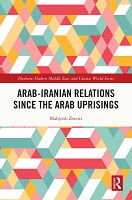Chapter 1 Why Studying Arab–Iranian Relations Matters
Proposal review
Abstract
Unlike most writing on Arab-Iran relations, which looks at specific episodes and specific countries, this book, taking a long term view, assesses the overall dynamics of the relationship, discussing in particular how far religion or politics drives the relationship. It argues that although Iran asserts that religion is a key factor underpinning a coherent approach to international relations, in fact what turns out to be the key factor is the politics of particular circumstances and Iran’s specific interests. The book considers Iran’s differing reactions to the Arab uprisings of 2011 onwards, showing that while Iran supported the uprisings in some countries it sided with repressive governments in other countries. The book also examines Iran’s reaction to its own outbreak of popular discontent in 2009 which was controlled by what has been considered as severe repression and explores how Iran is viewed by ordinary people in different Arab countries.
Keywords
Arab Iranian Relations,Pahlavi Script,Arab Uprisings,Persian Language,Sassanian Empire,Islamic Revolution,Iranian Foreign Policy,Arabic Script,Islamic Republic,GCC State,Palestinian Muslim Brotherhood,Muhammad Ibn Abd Al Wahhab,Arabic,Arabic Language,Arab Muslim Army,Political Islam,Middle Eastern Region,Syrian Muslim Brotherhood,Iran Iraq War,Shia Iraqi Government,Supreme Leader,Iran’s Support,Iraqi National Congress,Arab States,Vice VersaDOI
10.4324/9781003346111-2ISBN
9781032386539, 9781032386553, 9781003346111Publisher
Taylor & FrancisPublisher website
https://taylorandfrancis.com/Publication date and place
2024Imprint
RoutledgeClassification
Ethnic studies
Social research and statistics
Regional / International studies


 Download
Download